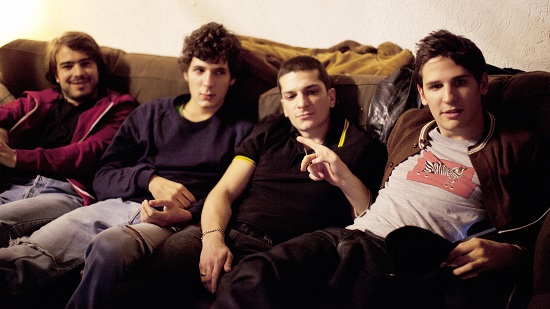Mia Hansen-Løve has cultivated a remarkable talent for charting the ephemeral nature of time. Her previous three features form a loosely autobiographical trilogy, each someway calibrated to the ebb and flow of the director’s own experiences. From the teenage heartbreak of 2011’s Goodbye First Love to the mature exploration of grief in 2009’s Father Of My Children her observational naturalism beautifully extracts the universal from the personal. Her latest effort, Eden (2014) is an ethnological voyage into the Parisian Electronica scene that gave the world Guy-Manuel de Homem-Christo and Thomas Bangalter, better known to the world as Daft Punk.
Based on the real-life experiences of her brother Sven who achieved moderate recognition in the early 2000s as part of the group Cheers, Eden feels like it’s made by someone who’s spent their youth on the dance floor. A vivid and immersive tale about obsession and the fine line that separates the professional and personal life of an artist, Hansen-Løve funnels her brother’s experiences through a surrogate DJ named Paul (Félix de Givry), a teenager drawn to the soulful melodies of Chicago garage music and heavily involved in the early-nineties Paris underground scene.
Eden is split in two halves; the first ‘Paradise Garage’ takes place in the nineties when ‘the French touch’ first began to achieve notoriety. In one memorable scene we arrive at a fancy dress party just as Daft Punk are about to drop their breakthrough single, 1997’s ‘Da Funk’. It’s a pivotal point in the film, with Hansen-Løve presenting the audience with a narrative crossroads. Where other directors would lead us down the path of fame and fortune, she steers us towards a different route entirely; to a world where dreams and responsibility are in constant conflict. Paul, although a moderately successful DJ, finds himself on the outside looking in.
The film’s second half, ‘Lost in Music’ sees Paul’s commitment to his art anchor the film in his narrow subjectivity as tastes and fashions move on without him. The realisation hits Paul at New Year’s Eve when, midway through his set at a boat party, he looks out onto an empty dancefloor. His crowd have disembarked and boarded a neighbouring ship where ‘The Macarena’ is in full flow.
By creating a deeply personal, generational portrait of an artist whose craft has fallen out of style, Hansen-Løve recollects not only a period of time but a very specific state of mind. Neither is this a story of hedonistic excess. Paul’s career never reaches the highs of Daft Punk but the film does capture that sense of an opportunity missed, a life where a stronger focus on work rather than pleasure, composing rather than remixing, could have led to a different conclusion. Yet despite the film’s vaguely pessimistic outlook the pursuit of art is never portrayed as futile, a theme that has been present in all Hansen-Løve’s work, with Paul’s salvation coming not from a clichéd romance or paternal intervention but through the re-discovery of literature and writing.
Like a time-lapse photo of an imploding consciousness, Eden offers a unique sense of place, with Hansen-Løve’s understanding of how to articulate the passage of time turning a lifetime into a momentary swell of emotion. Eden is a film that yields to time rather than distorting it for narrative’s sake and the film’s two decades unfurl so discreetly that it hardly feels as if any time has passed. It’s only during one scene when an elderly lady, observing an inebriated Paul being hauled through their shared stairwell by his friends, bemoans his drunken state by saying "Kids these days" that the penny drops. When he replies "I’m 34" a distinct feeling of shock resounds through both the audience, and Paul.
For those that fail to fall under Eden’s hypnotic spell the film ultimately doesn’t add up to a whole lot and, as the euphoria disperses and the melancholy sets in, the film’s allure begins to fade. Paul’s decline lacks any dramatic punch; mainly because of the bubble of privilege his life is sealed within. His financial troubles and substance abuse never instill any real sense of peril and it would have been nice to see Sven’s experience bestowed upon a less advantageous character, allowing the film to explore the broader consequences of artistic obsession. Sadly the epic scale and transcendence of the club scenes are never replicated in the bedrooms and living rooms of Paul’s life, with Hansen-Løve’s obvious affection for her brother ultimately tempering the criticism of his lifestyle.
Hansen-Løve’s instinctive feel for the era effortlessly captures the emotional arithmetic of a life lived on the margins of success and this shallow self reflection is also part of the film’s charm; it’s anaesthetized tone is testament to the music’s ability to enable us to forget the real world and become lost in the rhythm. What could have been a cliquey film about a transient sub-genre of dance music expands into a hypnotic study of longing and belonging and, regardless of your own musical tastes, there’s something irresistible about the way Eden becomes wholly caught up in its broad surge of feelings; pungent with memory and regret, stuck somewhere between euphoria and vain introspection.
Eden is out now


